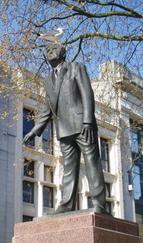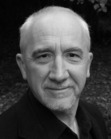A Trip to Wales and Another Good Welshman
 The wife and I spent the weekend in Wales - most appropriate of course, to be back home for St David’s Day! We stayed with a newly reacquainted long-lost relative in Cardiff. One of my first engagements as a professional actor was for a theatre company, long defunct, based in Cardiff, called the Welsh Drama Company. I enjoyed working in the city then and have continued to do so whenever work or play have taken me back there. It has continued to improve as a city. When I worked there initially the magnificent St David’s Hall was simply a building site and the whole shopping area around it was in the process of being redeveloped. A great deal of Cardiff was rather grey, just as much of post-industrialised Britain looked back then. Its heyday as a port, at one time one of the world’s largest exporters of coal, was past, and this once economically vigorous city was struggling to find a new role for itself in the world. Of course Cardiff has seen many more great building projects since the late Seventies, including the redevelopment of the whole Bay Area which includes the Welsh Assembly Building and the Millenium Centre. And of course our national passion (bordering on obsession) for the game of rugby is now catered for at the magnificent Millenium Stadium, right in the heart of the city.
The wife and I spent the weekend in Wales - most appropriate of course, to be back home for St David’s Day! We stayed with a newly reacquainted long-lost relative in Cardiff. One of my first engagements as a professional actor was for a theatre company, long defunct, based in Cardiff, called the Welsh Drama Company. I enjoyed working in the city then and have continued to do so whenever work or play have taken me back there. It has continued to improve as a city. When I worked there initially the magnificent St David’s Hall was simply a building site and the whole shopping area around it was in the process of being redeveloped. A great deal of Cardiff was rather grey, just as much of post-industrialised Britain looked back then. Its heyday as a port, at one time one of the world’s largest exporters of coal, was past, and this once economically vigorous city was struggling to find a new role for itself in the world. Of course Cardiff has seen many more great building projects since the late Seventies, including the redevelopment of the whole Bay Area which includes the Welsh Assembly Building and the Millenium Centre. And of course our national passion (bordering on obsession) for the game of rugby is now catered for at the magnificent Millenium Stadium, right in the heart of the city. Any visitor entering Cardiff’s Queen Street from the Castle end is met by the statue of Aneurin Bevan (1897 - 1960), or Nye as he’s more affectionately remembered in Wales. He was born and raised in the valleys town of Tredegar, the son of a coal miner. He left school to work in the pits himself at the age of thirteen, where he soon became active in the trade union movement, which sent him to Central Labour College in London. It was here that he gained in confidence as a speaker and began to overcome the stammer that he had been afflicted with since childhood. In 1929 he stood and became elected as the Labour MP for Ebbw Vale, and he was to remain in this seat for the next thirty-one years until his early death. He is perhaps best remembered for his achievement as the architect of the National Health Service, which became fully operational on the 5 July 1948. He defined a civilised society as one that takes care of its weak and vulnerable. Those of us who have grown up in a happy time where health care was provided unquestioningly by the state have Nye Bevan to thank for this. The National Health Service wasn’t born without suffering the pangs of childbirth and was vehemently opposed by the Conservative Party, the British Medical Association and by some in Bevan’s own Labour Party.
Any visitor entering Cardiff’s Queen Street from the Castle end is met by the statue of Aneurin Bevan (1897 - 1960), or Nye as he’s more affectionately remembered in Wales. He was born and raised in the valleys town of Tredegar, the son of a coal miner. He left school to work in the pits himself at the age of thirteen, where he soon became active in the trade union movement, which sent him to Central Labour College in London. It was here that he gained in confidence as a speaker and began to overcome the stammer that he had been afflicted with since childhood. In 1929 he stood and became elected as the Labour MP for Ebbw Vale, and he was to remain in this seat for the next thirty-one years until his early death. He is perhaps best remembered for his achievement as the architect of the National Health Service, which became fully operational on the 5 July 1948. He defined a civilised society as one that takes care of its weak and vulnerable. Those of us who have grown up in a happy time where health care was provided unquestioningly by the state have Nye Bevan to thank for this. The National Health Service wasn’t born without suffering the pangs of childbirth and was vehemently opposed by the Conservative Party, the British Medical Association and by some in Bevan’s own Labour Party.The National Health Service is, we are currently told by too many of its workers to be just scare-mongering, splitting at its seams. It is one of the finest institutions this country has, and we would all be far poorer for its loss. I for one will almost certainly be considering it as one of the foremost issues to be considered when the time comes for me to cast my vote in the general election in May. My Great Aunt Mary had lived almost sixty years before the National Health Service and the Welfare State were fully in place for the protection of all British citizens. I was often amused as a young boy when she expressed her darkest fear of ending up in the workhouse - it seemed preposterous to me then; workhouses belonged to the world of Oliver Twist and Charles Dickens! Actually, the workhouse system was only abolished in 1930. But the kind of poverty experienced by the working classes of the past isn’t possible today, is it? Again, I am reminded of Food Banks and the 900,000 British people forced to resort to them last year.
In 2004 Aneurin Bevan was voted No 1 by the people of Wales in a poll to name 100 great Welsh men and women. After my recent visit to Wales, and seeing as it’s customary for this blog to present to its readers a Good Welshman or Welshwoman on St David’s Day - I give you Nye Bevan: “The National Health service and the Welfare State have come to be used as interchangeable terms, and in the mouths of some people as terms of reproach. Why this is so it is not difficult to understand, if you view everything from the angle of a strictly individualistic competitive society. A free health service is pure Socialism and as such it is opposed to the hedonism of capitalist society.”
Published on March 04, 2015 07:38
No comments have been added yet.



